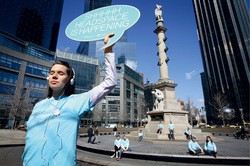Headspace – The Little App of Calm
Polly Vernon
Andy Puddicombe is the international poster boy for the modern ‘mindfulness’ movement. He’s 41 (“Unless you want to knock a few years off?”), a short, muscular surfer who grew up near Bristol, but now lives in the Venice Beach area of Los Angeles, an ex-Buddhist monk (fully ordained) with a degree in circus skills and a particular fondness for “animals which form unlikely friendships with other animals.” Like if a goat befriends a horse? “Exactly.”
He’s the co-founder of Headspace: a secular course in meditation and mindfulness that sits on your smartphone in the form of an app, and promises to change your life by leading you through a series of daily meditation practices, all of which are voiced by Puddicombe. “‘Gym membership for your mind,’ that’s how we want people to think of it,” he says. Puddicombe gets a little awkward when attempting to spew out branding buzz terms – he’s not very comfortable with them. He puts that down to all the time he spent in monasteries. He missed the Spice Girls. And “the internet”, he says. “It took a while to catch up.”
Headspace is the app of the moment. It’s hot and growing fast. Puddicombe launched it with business partner Rich Pierson as a paid-for app a little under 18 months ago. Since then, Headspace has achieved more than one million downloads in 150-plus countries, three of which were paid for by Gwyneth Paltrow, Emma Watson and Davina McCall. “They found it. We don’t go after celebs,” says Puddicombe. Paltrow raved about it on her lifestyle blog, Goop. Watson tweeted about it (“Downloads doubled immediately afterwards,” Pierson tells me). Davina McCall tweeted: “It is totally amazing. Really really amazing. Sorts my noggin out.” Virgin Atlantic offers a Headspace channel on inflight entertainment packages; new admissions to the Priory, the rehab clinic, get Headspace as part of the welcome pack; Puddicombe and Pierson are about to close a deal with Harvard University that will mean every new student receives the app. “It’s becoming a valuable thing,” Puddicombe admits.
I’ve done Headspace almost every day, and it has, without question, Changed My Life. How? I’m less stressed, less engaged with the frenzied intensity of a life dictated by how many emails I can read, how quickly, while simultaneously texting a friend, tweeting a thought and failing to meet a deadline. If I wake up in the night, I fall back to sleep quickly. I still get anxious, I still get sad, I still get revenge fantasies (oh yeah), but – they don’t consume me. I drink less coffee and Diet Coke, and I’ve almost completely abandoned booze. That’s mindfulness for you: it makes it tough to do the self-destructive stuff
How valuable?
Puddicombe tells me to ask Rich Pierson, who ducks the question for as long as he possibly can, before reluctantly saying, “It would roughly be valued at $40-$60 million.” Wow, I say. But, he adds anxiously, “Those are not our words; that’s what we’ve been told. And this is all fantasy land – you know these things are insane and the sums people throw about are ridiculous – and we have never talked about this to anyone, even our friends and family. People get so hung up on money.”
You could see Headspace’s raging success as part of society’s renewed interest in a more spiritual kind of wellbeing. “Mindfulness is the new black,” the Huffington Post decreed; Goldie Hawn delivered a speech on its potential at Davos last month. GPs are increasingly recommending it as a way to ease patients off antidepressants. Every second person I meet seems to be ‘doing’ it in some way: mindful eating, mindful parenting, mindful loving.
Mindfulness is also gaining traction in unexpected places. The US Marine Corps, faced with record suicide rates, runs a pilot project that builds mindfulness into basic training. Corporations have begun offering mindfulness training as part of their employment packages, to increase concentration levels and reduce the time employees take off on stress-related sick leave. Google has a dedicated mindfulness training camp in California; employees get access to a seven-week training course.
So what exactly is it?
A Buddhist-developed practice, it promotes awareness of the moment as an alternative to submerging yourself in painful, stressful, unpleasant memories from the past, or anxiety over the future. It teaches you how to see your thoughts and feelings, to observe them as if they were road traffic; to not over-identify with them, or get caught up in them. If it sounds airy-fairy – “flaky” as Puddicombe puts it – there’s significant scientific fact growing in its favour. Research into the effectiveness of mindfulness has been building since the middle of the last decade, when NICE, the National Institute for Health and Care Excellence, first approved it for clinical use in the UK for depression. In early January this year, a report based on the analysis of 47 clinical trials involving 3,000 participants showed that mindfulness produces “measurable improvement of up to 20% in symptoms of anxiety and depression… and can also help alleviate feelings of stress and enhance the quality of life.”
Still not convinced? Well, there’s me. I downloaded the free, introductory ten-session sample of Headspace six months ago. I’m not sure why; this sort of thing isn’t my bag.
Session one went well. Puddicombe presents it, and is himself presentable: cheerful, relaxed, neutral-accented, all checked shirts and easy chat. He doesn’t talk slowly, dreamily. (When we meet, he tells me he doesn’t know why anyone ever does. “I’ve been in ashrams and stuff with people who always… talk… like… theeeeeeeees… Everyone’s… like… theeeeees… Like an asylum or something.”)
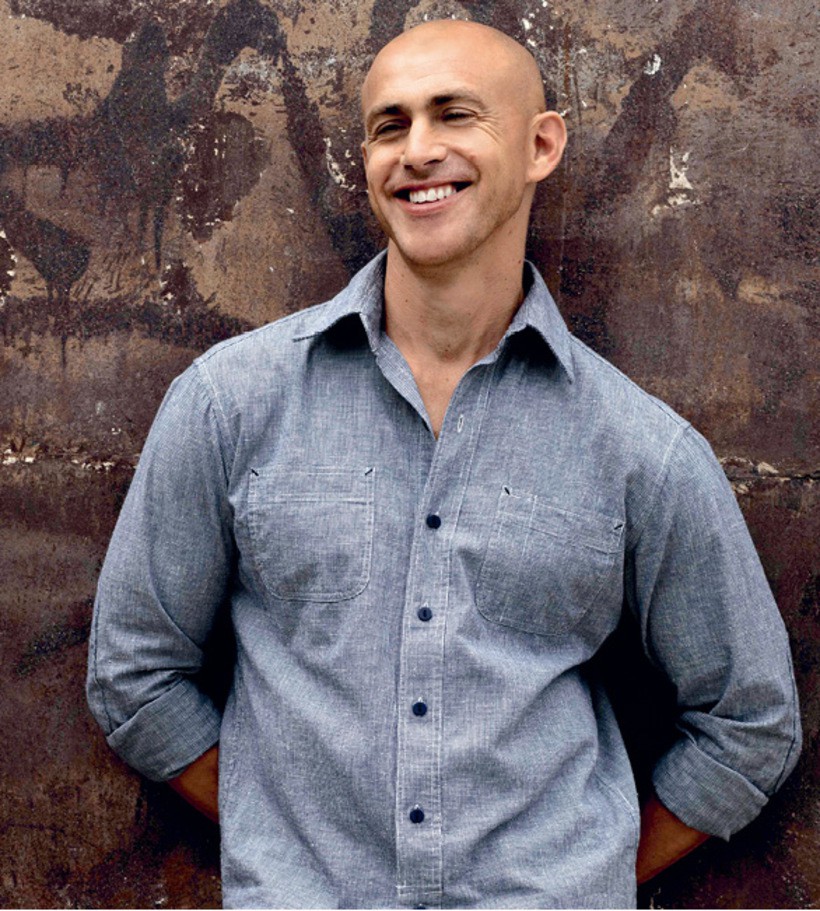 Andy Puddicombe is the international poster boy for the modern
‘mindfulness’ movement, and co-founder of Headspace: a secular course in
meditation and mindfulness that sits on your smartphone in the form of
an app, and promises to change your life.
Andy Puddicombe is the international poster boy for the modern
‘mindfulness’ movement, and co-founder of Headspace: a secular course in
meditation and mindfulness that sits on your smartphone in the form of
an app, and promises to change your life.
Headspace’s thing is to get meditation and mindfulness to the kind of audience who’d never normally dabble with it: the cynics, skeptics, and the anti-hippies. And to men, who now represent 55% of Headspace users
And he says things that make sense to me, about the unsettling churn of thought that runs my mind, about the desirability of space from that, about the possibilities of a life lived more lightly.
Once I finish the ten-day sample, I’m hooked. I sign up for a year, 365 different audios that lead you through a well-plotted mindfulness “journey.” It costs around £54 [$89].
I’ve done it almost every day since, and it has, without question, Changed My Life. How? I’m less stressed, less engaged with the frenzied intensity of a life dictated by how many emails I can read, how quickly, while simultaneously texting a friend, tweeting a thought and failing to meet a deadline. If I wake up in the night, I fall back to sleep quickly. I still get anxious, I still get sad, I still get revenge fantasies (oh yeah), but – they don’t consume me. I drink less coffee and Diet Coke, and I’ve almost completely abandoned booze. That’s mindfulness for you: it makes it tough to do the self-destructive stuff. “Hedonism? Yeah, it can start to seem a bit like hard work,” Puddicombe tells me.
My trip to Los Angeles, to Headspace, is about as close as I’ll ever come to a pilgrimage. I tell Puddicombe and Pierson this. They laugh.
Headspace HQ is just off Abbot Kinney, an extremely cool, hipster-colonised street in Venice Beach. Puddicombe takes me for a juice, tells me he’s heard word that “collard is the new kale,” then walks me to the new Headspace office: light and airy and extremely minimal. It adjoins the private office of the man who created Grand Theft Auto, only he isn’t there that much, apparently; and they’re a block away from Gold’s Gym, where Arnold Schwarzenegger trained.
Headspace HQ is populated by a smattering of good-humoured employees. I’d wondered if it might feel a bit culty, but no. It feels like a hot new tech start-up.
Puddicombe and Pierson are expanding. “There are 20 of us in [the] London [office], and we’ve got ten out here,” says Puddicombe. “Between now and June, we’re hoping to take on 15-20 people for the LA office. Middle of the year, July, August, we’ll probably be 50, as a team.” “People normally come to us,” adds Pierson. He’s 33 years old, small and handsome; a bit like a good-looking doll. “They find us.”
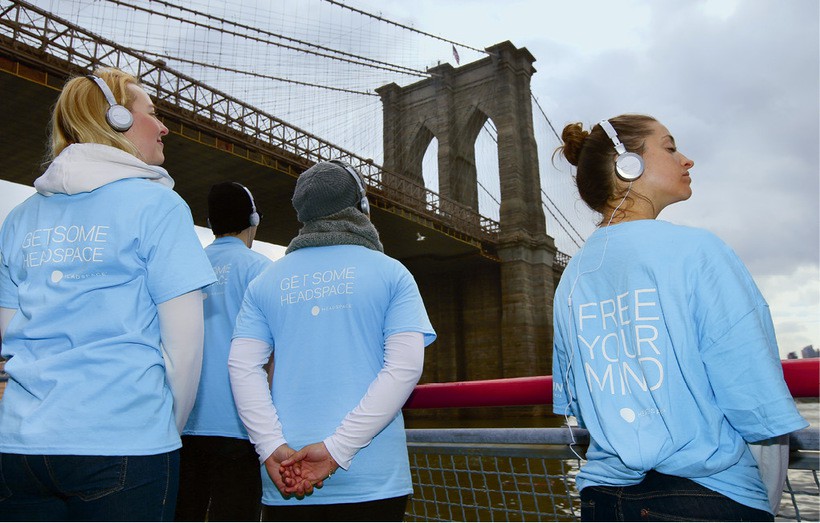
Pierson grew up in Kent, the son of a self-made businessman and a boutique-owning mother. He spent the early part of the 2000s working as a creative in the London advertising industry, a member of the team at Bartle Bogle Hegarty, “out all the time, drinking a lot, buying a lot of trainers, hanging out with d***heads, probably being the biggest d***head…” as he puts it. At 26, he got promoted and collapsed under the pressure. “I fell into a fit of depression.” In 2007, a friend suggested he see Puddicombe, who was treating depression with meditation courses at a private clinic in the City. The two men got on immediately: “a big old bromance.” Puddicombe was thinking about taking mindfulness techniques to a wider audience, and asked Pierson for advice. “We ended up doing a sort of a skills swap,” says Pierson. “We’d do an hour of meditation, then go across the road to Starbucks, filled with City boys, and do Marketing 101.”
Puddicombe knew nothing about that sort of thing. Aged 22, he’d walked out of a degree in sports science, convinced he should go to India and train to be a Buddhist monk.
How does anyone come to that conclusion, I ask. We’ve relocated to a bench just off Venice Beach itself. Surf pounds, the sky’s blue, and Puddicombe is telling me his life story.
“It’s really hard to explain. I’d talked about it with a girlfriend who was interested in meditation, and she kept telling me there were these monks and nuns and stuff, and after a while I thought, that’s probably what I need.”
How did the girlfriend take that?
“Really badly.”
He had attended his first meditation class with his mother when he was 11; he’d gone on the understanding he’d learn kung fu. “But I liked it. I kept on, on and off, for a couple of years.” He gave meditation up for sport in his mid-teens. But then trauma struck at 18. In the same six-month period, four people close to him died. “I was just like, ‘Jeez.’ Didn’t know what to do with it.” He “ran away”, travelled, then began the sports degree. But “there was this nagging stuff, which I just hadn’t dealt with”. One afternoon, at the end of his first year, he concluded that the only way he could deal with it was by becoming a monk. “I went straight into university that afternoon, told my head of year. He said, ‘This is crazy. Get some Prozac. You’re going to regret this decision for the rest of your life.’ ”
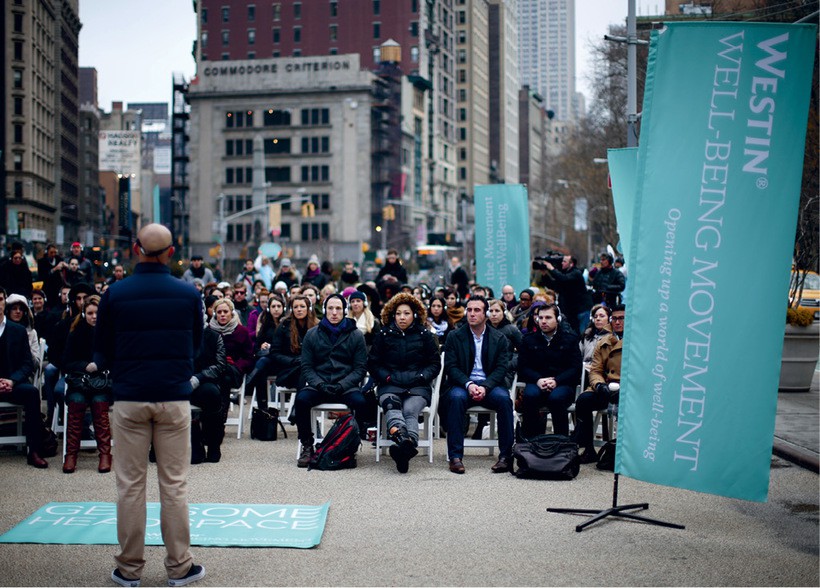 A Buddhist-developed practice, it promotes awareness of the moment as an
alternative to submerging yourself in painful, stressful, unpleasant
memories from the past, or anxiety over the future.
A Buddhist-developed practice, it promotes awareness of the moment as an
alternative to submerging yourself in painful, stressful, unpleasant
memories from the past, or anxiety over the future.
It teaches you how to see your thoughts and feelings, to observe
them as if they were road traffic; to not over-identify with them, or
get caught up in them
Do you regret it?
“No. Unquestionably, it was the best decision I’ve ever made in my life. Other than marrying my wife.”
Puddicombe went to Dharamshala, India, because “that’s where the Dalai Lama was. It seemed like a good place to start.” He “blagged” his way into a retreat, and from there, began his formal training. “Hard. Really, really hard. The first one I did, 18 hours’ meditation a day…” Then there was the celibacy. “That was the real challenge. As a young guy.”
After a few years ducking in and out of novice life and monasteries in Tibet and elsewhere, of periods of celibacy interspersed with relationships (while Puddicombe continued to train as a lay person), he was ordained as a full Buddhist monk, and sent to a monastery in Moscow, where he lived and worked for more than four years. While there, “aged about 30, I met this chap, Marcus, who worked with BP. He’d been a Buddhist for about 20 years.” He introduced him to the idea of teaching mindfulness in a corporate environment “and to the idea of not being a monk. Leaving the monastery. He said, ‘I think you could do some really amazing things in the world.’ I thought, ‘What’s more important to me? Being a monk or teaching meditation?’ And by that point, I wasn’t adverse to the idea of having a partner, a wife, maybe a family.”
But leaving a Moscow monastery to return to the UK threw up logistical issues. He calculated that he could go to London to study: “Get a student loan, get a grant…” A contact at the Moscow State Circus (“Bear with me, Polly, I know how this sounds…”) suggested he study circus arts, because he was good at “straps, which is where you roll up, you spin round, that malarkey. And balance. I had a young German girl who used to balance on my head.” So he moved to London, studied at circus school during the day, and formulated corporate-friendly meditation courses at night.
He got injured in his final year of the degree. “We were doing some photographs for a magazine, and Natalie the German girl was standing on my head. My neck gave way. I ended up on a spinal board, going to hospital, and then I got sent to rehab.”
While there, he met a sports physiotherapist called Lucinda, whom he would marry. He also ended up getting treatment at a clinic that would go on to hire him to practise meditation. “I was 34. This was… 2006, 2007. Mindfulness had just been approved by NICE for use in the treatment of depression. There were no clinically trained people, so their only option was to take on people like me, who had no clinical experience but who had trained in mindfulness.” Clients were predominantly “City folk – male and female, but 80% male – who were struggling around the financial crisis.”
Did he not find them resistant to the idea of meditation?
“Really resistant. But that was brilliant. Because they were such a tough audience, that made me find a language that fed into the Headspace mission and vision. They were the far end of the spectrum, which was perfect.”
This, then, is Headspace’s thing: to get meditation and mindfulness to the kind of audience who’d never normally dabble with it: the cynics and sceptics, the anti-hippies such as me. And to men, who now (surprisingly, and to the delight of Rich Pierson in particular) represent 55% of Headspace users.
“It was Rich who pushed the boundaries: ‘Let’s try to reach people who’ve never done meditation. Forget the people who are already leaning towards meditation; they’ll find it.’ ”
Also, they’re annoying hippies, I say. Puddicombe laughs.
So Pierson brought his branding experience to the Headspace table, his awareness of how to target a product at a specific market with language and visuals, and Puddicombe brought the expertise. Who came up with the name?
“Richie did the Head. I did the Space.”
They started with a series of events four years ago, “Headspace on tour” – monthly eight-hour sessions at a 300-seater venue which cost £250 [$415] a ticket.
They were certainly profile-building, but filling three hundred seats at £250 a pop was never going to be easy. Plus, “We started getting requests: ‘Could you give us a few days to take away?’ Or friends started saying, ‘I can’t come to London. Is there something I can use?’ So we started selling what’s now Take Ten [the free Headspace sample], for about a tenner [$17], as an old-fashioned podcast. Then people said, ‘Have you got any more? What do I do after ten days?’ So they sat me in a recording studio…”
Puddicombe was resistant to the idea of producing video and audio content. “I wasn’t familiar with being recorded; it was all a bit alien, to sit down with a microphone. I prefer the live stuff.” Also, he is extremely passionate about one very specific aspect of his work. “Lineage. The only reason the teachings work is because they’ve been passed down from one person to the next. The oral tradition. And over many hundreds of years, they’ve been refined and developed.” He was, and remains, anxious that the lineage should not be messed with. “I’m anal about that. Richie’s anal about the colour palette.”
Once Pierson had convinced Puddicombe that the future for their company was digital, Puddicombe was required to do around 700 hours of recordings in Soho studios over the course of six months. “Which was hard enough. Only it turned out I had cancer. I didn’t know that then.”
Weeks after the pair of them relocated their operation to LA, last March, Puddicombe was diagnosed with a very aggressive form of testicular cancer. “They whipped out one of the jewels, right away. They said, ‘You haven’t got a family.’ Had to do a deposit.”
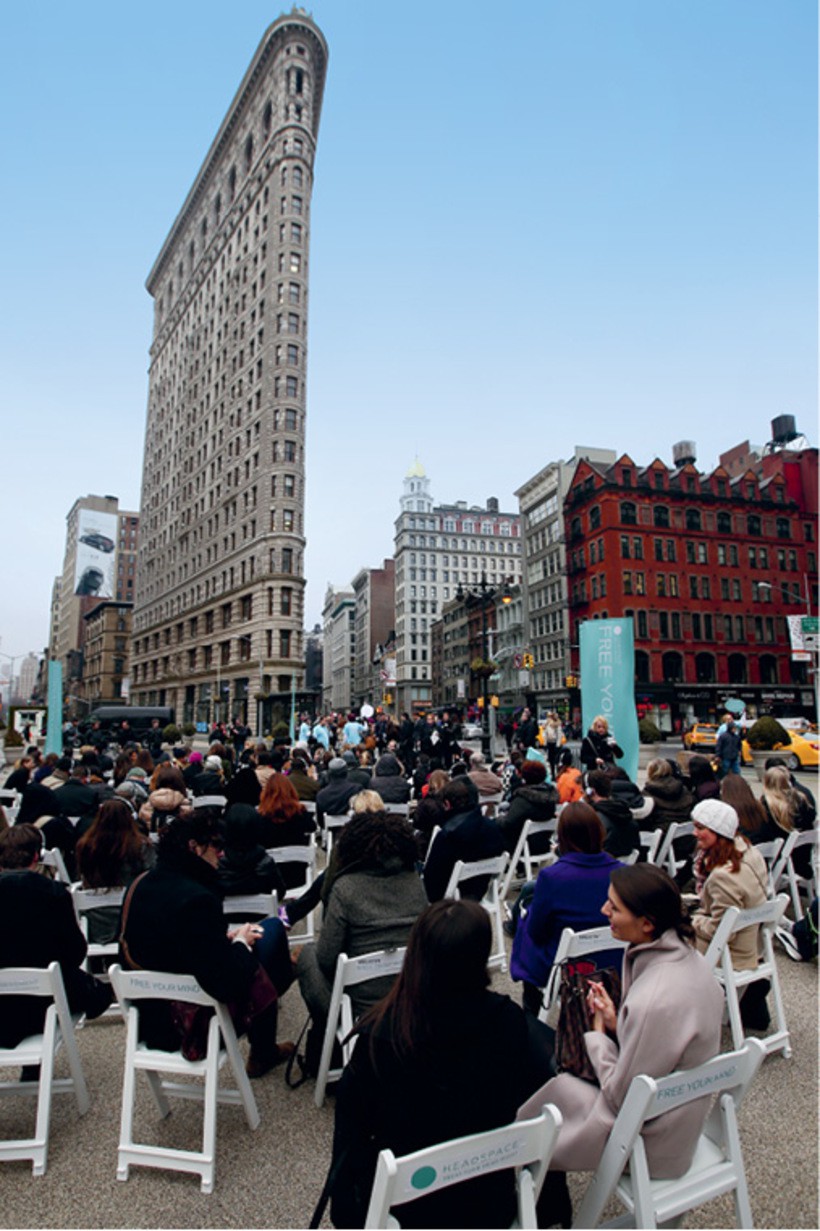 That must have been tough.
That must have been tough.
“Pretty tough. Pretty stressful.”
Now, less than a year after the diagnosis, Puddicombe appears to be cancer-free. He’s being treated by Lance Armstrong’s doctor – “The cancer one, not the dodgy one” – because he was the only oncologist to offer an alternative to more invasive preventative surgery and chemotherapy. “Now I get scanned regularly, so they can check.” He’s OK, he says. The scans remain clear. “But I don’t feel it’s over. I’m going to get scanned for the next five years. And OK, it’s great at the moment. Don’t get me wrong, I’m really happy that nothing’s coming up. But it doesn’t feel like, right, let’s all go out and get drunk.” The coda to all this is that Lucinda Puddicombe is now pregnant with the couple’s first child.
Pierson and Puddicombe never thought Headspace would fail. When they came up with the idea, Puddicombe says he felt as he had at university, when contemplating becoming a monk: “Like there was no other option available, in the nicest possible way.” “We are also a couple of total optimists,” says Pierson.
Their ambitions are vast. Puddicombe says he would like ten million downloads within the next couple of years. “Five years? Rich and I talked, early days. Could we get 100 million doing this? It sounds extravagant, ridiculous but… look at yoga.”
But there are complications involved with scaling up their operation. First, they have to find and hire international Andys, people who can voice Headspace for non-English-speaking territories. “We need to find a Juan,” says Puddicombe.
On top of which is the issue of his burgeoning fame.
“There isn’t any, really,” he says.
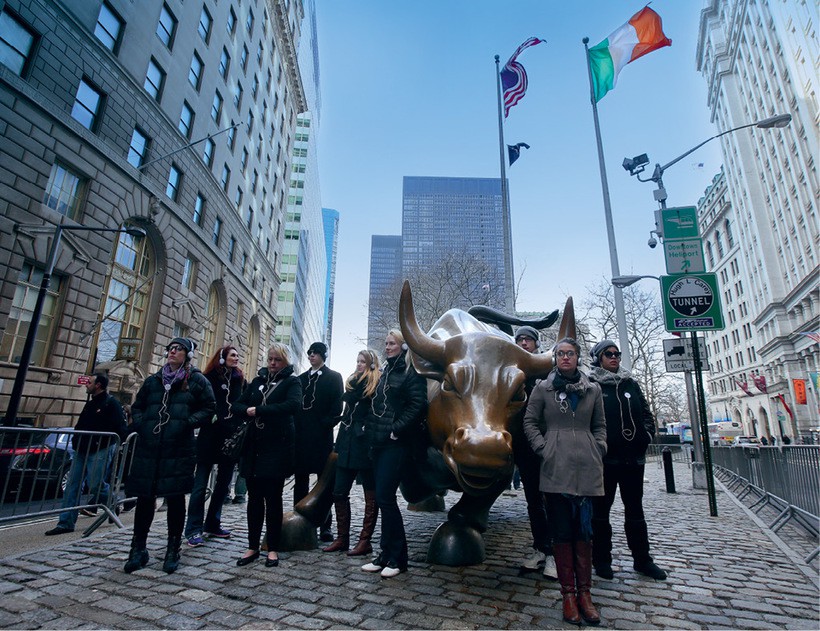
Well, there is definitely some, I say. I knew who he was before I met him; plus, he’s told me he got spotted three times in the same morning on the streets of Notting Hill over Christmas. And this story: “I was on the Tube, packed carriage, and this man kept staring at me. I wasn’t sure why, ducking out the way behind my Metro… The train pulls into the station, the guy looks at me and says, ‘You changed my life.’ Then gets off. The whole carriage turns to look at me: what did you do to that man?”
He loathes the idea of being considered a guru. “In the traditional sense of the word, I am so far off that. Not even in that league. From a Western point of view, there’s so much wrapped up in the self-help movement… When Rich and I sat down and looked at how we were going to do Headspace, we picked out three or four so-called gurus, and we said, ‘Right. This is where we don’t want to be.’ ”
Sinister cult-of-personality sort of thing?
“Exactly.”
I wonder if Headspace is making Puddicombe and Pierson rich, or how they feel about the inevitability that, if it’s as successful as they hope, it soon will.
“Well,” says Puddicombe, “it’s still a start-up. So we’re at an interesting stage where we get Silicon Valley venture capitalists, on the phone and on email, every week. We went through a phase, couple of months ago, when we had 20 in the space of a few weeks: ‘Are you looking for investment?’ They’d come down, take us for dinner.”
Show you a good time?
‘‘Weeell… It was OK. [But] some of them! Talk about misreading! Richie and me, we’re normal blokes, but also, given the nature of what we do… We met up with these guys in Paris, where we were doing a talk. A venture capitalist firm wanted to meet us there. And they sat down, American guys, and they’re kind of, ‘Once we invest in someone, we’re really tight with them. We’ll take them to lap-dancing clubs! You’d love our offices, they overlook this yoga studio where all these sweaty women come out!’ ” Rich and I are looking at this bloke: you could not have read this more wrong. Even if they’d made us an amazing offer, there’s no way in the world we could have done business with them.”
So you’re not rich?
“No! My wife would probably be OK about it, if I were. But me. If I can have my surfboard and my juggling balls, I’m pretty happy. Oh, and my dressing gown.”
He loves his dressing gown. He found it while staying at an Ace Hotel, hanging in the wardrobe for guest use, and he loved it so much that he bought it. He describes its benefits to me at length, says he has been known to do Headspace recordings while wearing it.
“I’ve got a matching one,” says Rich Pierson.
Yours is a bromance of epic proportions, I say.
“Yes,” Puddicombe says. “No one believes us, because we work together and spend our free time together and we moved to LA together, but we never argue.”
“Never,” says Pierson. “But really: how could anyone argue with an ex-monk?”
They take me to an afternoon screening of The Wolf of Wall Street by way of a goodbye gesture, which seems hilariously inappropriate given the definitively unmindful content of the film, but which is really fun.


